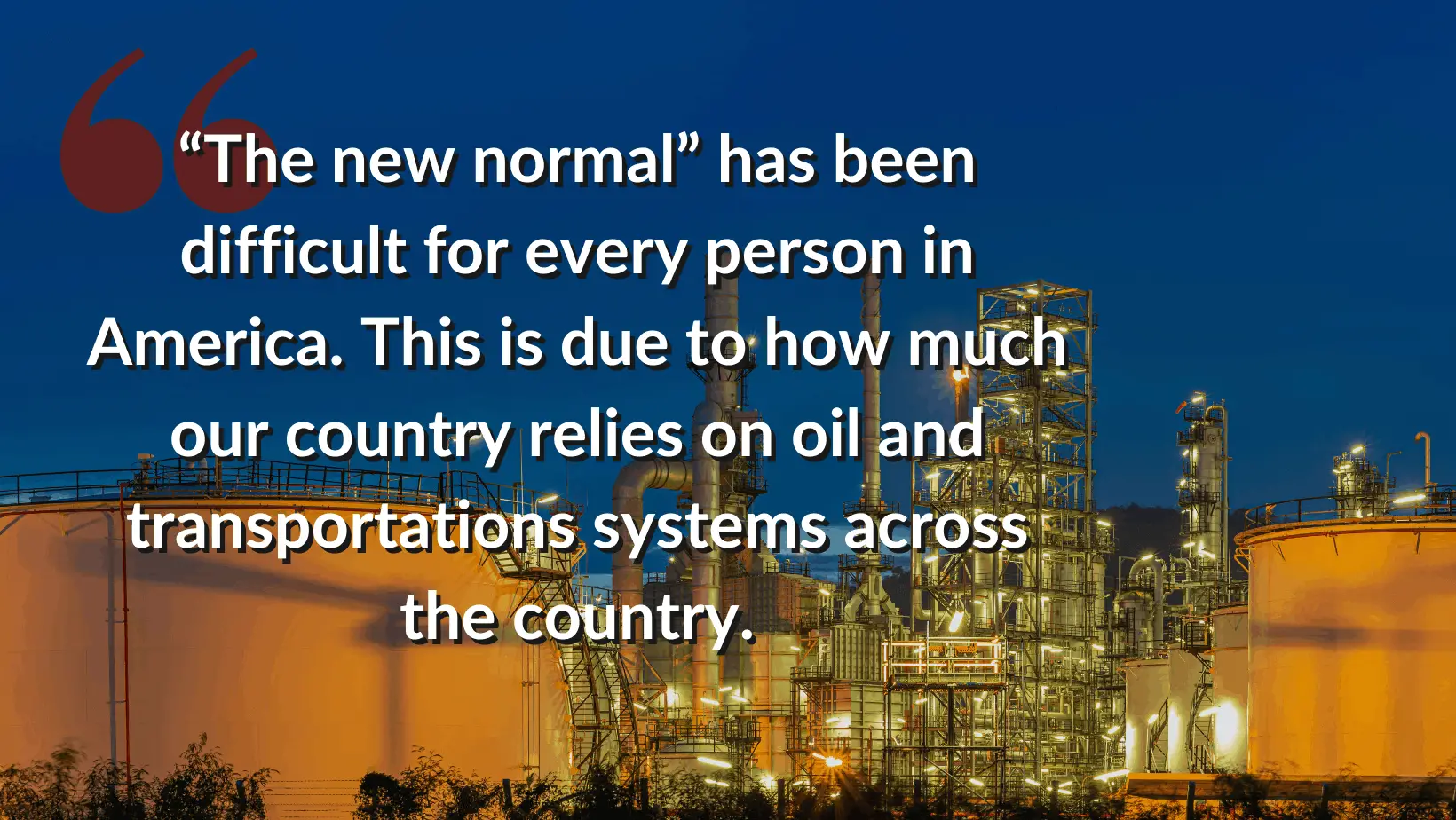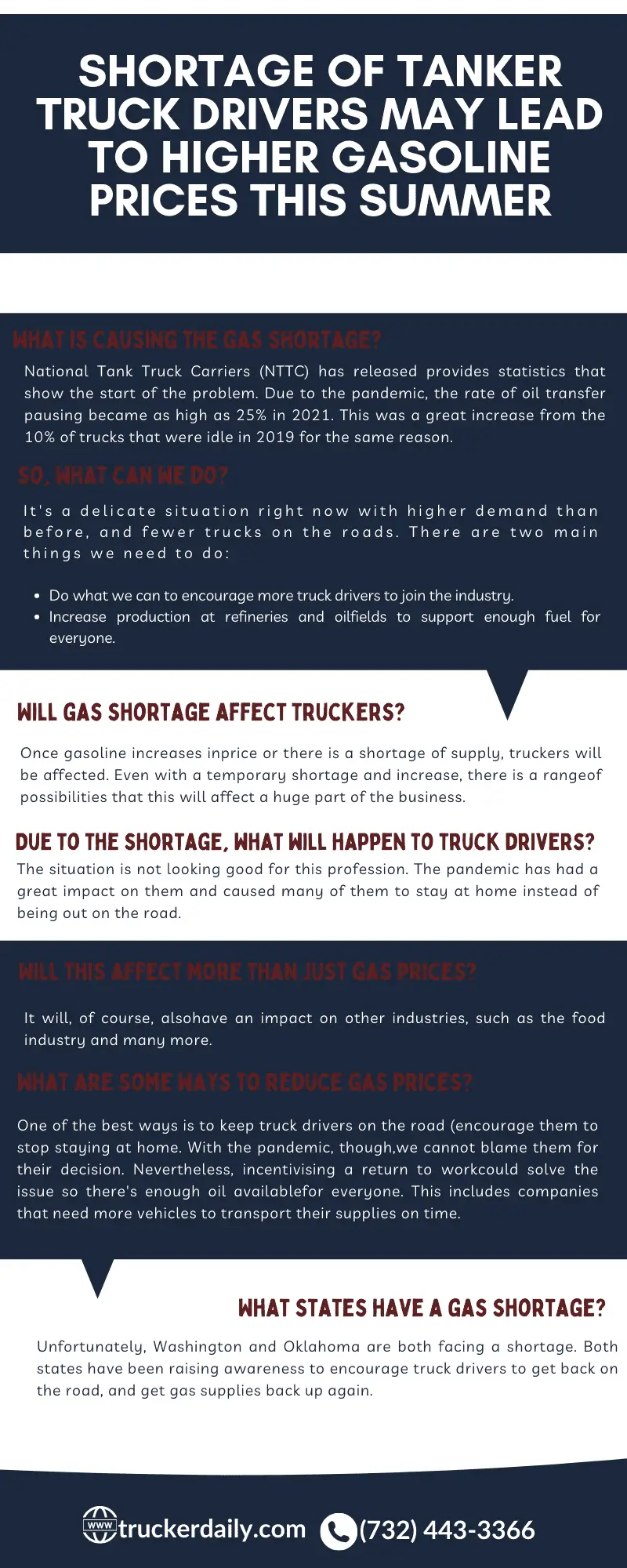Tanker truck driving jobs are mostly high-paying. It also comes with a lot of incentives and benefits, especially if you're an owner-operator. So why is there a shortage of tanker truck drivers?
The shortage of tanker truck drivers is mainly caused by a lack of qualified truckers. Gasoline prices, shortage of supply, and the pandemic also contributed to making the shortage even greater.
The problem with the shortage among tanker truck drivers is not only limited to the U.S. It also extends to Europe and other countries where transportation through tanker trucks is common.
Eventually, a shortage of tanker truck drivers will affect the economy as this affects the supply and demand of almost every product.
But that's not all there is to know about the shortage of tanker truck drivers. In this article, I've explored this topic further, and here's what I found:
In just four years with Highway Transport I made it to the national competition for the best tanker truck driver of the year. I didn’t take the first place, but I earned the recognition and the respect to be amongst the best. Imagine the next four years, thank you H/T! pic.twitter.com/6IJ4IGQYrq
— Alen (@submerge2001) June 19, 2021
Is there a shortage of gas tanker truck drivers?
There has been a shortage of gas tanker truck drivers years before the pandemic even began. The global pandemic made the shortage even worse.
A statement from Ryan Streblow, the executive vice president of National Tank Truck Carriers, states that "We've been dealing with a driver shortage for a while, but the pandemic took that issue and metastasized it, certainly has grown exponentially."
The start of the pandemic and lockdown caused most of the truck drivers to choose to stay at home. This caused a drastic shortage in oil that also forced residents to stay at home.
Another statement was made by Holly McCormick, the vice president of driver recruitment and retention at Groendyke Transport, an Oklahoma tanker company, "We were even hauling boxes for Amazon just to keep our drivers busy."
The pandemic has had a major impact on truck drivers and the transportation of oil. It has greatly influenced the state of the workforce and the drop in jobs.
"A lot of drivers didn't want to do the safety protocols. We're also working with an aging workforce. Many said, 'I might as well take it as a cue to retire.” Holly McCormick added.
For some, this shortage is worse than others. Jeff Lenard, a spokesman at the National Association of Convenience Stores, said in an interview on CNN that "I've talked to retailers.They say there could be places where there are brief outages," and "If they have no fuel, they have no business. People aren't going to stop in for a sandwich if you don't have fuel."
This could cause a big alarm in areas where total outage of gasoline is predicted.
Tom Kloza, a chief oil analyst for the Oil Price Information Service, also gave his word to the public with a warning. "If this news is published and spread on the headline, this can cause people to hoard gasoline as early as now."
Which is true at some point. People will always think ahead for their better good, even without understanding the consequence of their actions.
Tanker Truck Driver Shortage May Fuel Higher Gas Prices This Summer https://t.co/LWvFWxsm6r pic.twitter.com/JaLpWf8UB4
— Crypto Trader Pro  (@CryptoTraderPro) May 3, 2021
(@CryptoTraderPro) May 3, 2021
What is causing a gas shortage in 2021?
National Tank Truck Carriers (NTTC) has released statistics that show the start of the problem. Due to the pandemic, the rate of oil transfer pausing became as high as 25% in 2021. This was a significant increase from the 10% of trucks that were idle in 2019 for the same reason.
A few months ago, the shortage of tank truck drivers was 40%. The number is now down to 35%, but it is still high enough that there will be difficulty in transporting gasoline.
Most tanker truck drivers were unable to report to their work because of the pandemic.
Ensuring the safety of their family as well as cutting off the workforce, our truckers were forced to stay at home.
It's a delicate situation right now with higher demand than before and fewer trucks on the roads.

What is required to drive a fuel tanker?
To drive a fuel tanker, you need to get a CDL. Getting a CDL itself has a set of requirements you need to comply with, such as an existing driver's license, passing background checks, and a Medical Examiner's certificate.
Nonetheless, becoming a tanker truck driver is definitely worth it. If you’re aiming to get a CDL, I have written the exact article just for you. Just click on this link to read everything you need to know about getting a CDL.
From here, you can easily see why there is a shortage of tanker truck drivers. Losing a tanker truck driver is easy but getting a qualified replacement is hard.
The biggest challenge faced is finding new truck drivers that will fit the criteria to become tank truck drivers.
Unfortunately, few people are willing to take up the profession.
The special certification required to become qualified to drive a tanker truck, including commercial driver licensing, hazmat certification, and weeks of training, is unappealing to many people.
Paradoxically, due to the massive shortage, few companies have time to look for qualified and interested drivers. However, some companies are doing their best to look for anyone willing to meet the requirements and undergo training.
Although there is still hope of getting new truck drivers soon, it will be at least 2022 before they are ready to get on the road.

What are the implications of tanker truck driver shortage?
A shortage of tanker truck drivers will result in an imbalance of supply and demand. Eventually, gasoline prices will increase. Once gasoline increases in price or there is a shortage of supply, truckers will be affected.
It will, of course, also have an impact on other industries, such as the food industry and many more.
One of the best ways is to keep truck drivers on the road (encourage them to stop staying at home). With the pandemic, though, we cannot blame them for their decision.
Nevertheless, incentivizing a return to work could solve the issue, so there's enough oil available for everyone. This includes companies that need more vehicles to transport their supplies on time.
Conclusion
The shortage of truckers has been an ongoing problem even before the pandemic began.
As fewer drivers want to become tanker truck drivers, gasoline supply and prices are also affected.
On a positive note, the shortage of tanker truck drivers made them more in demand. This opened an opportunity for aspiring fuel tanker truck drivers to get higher incentives and even get trained for free or with the least expenses possible.
Sources:
http://lite.cnn.com/en/article/h_8917d24be29e2d54266b81370cb76950
